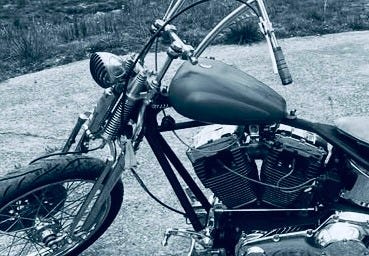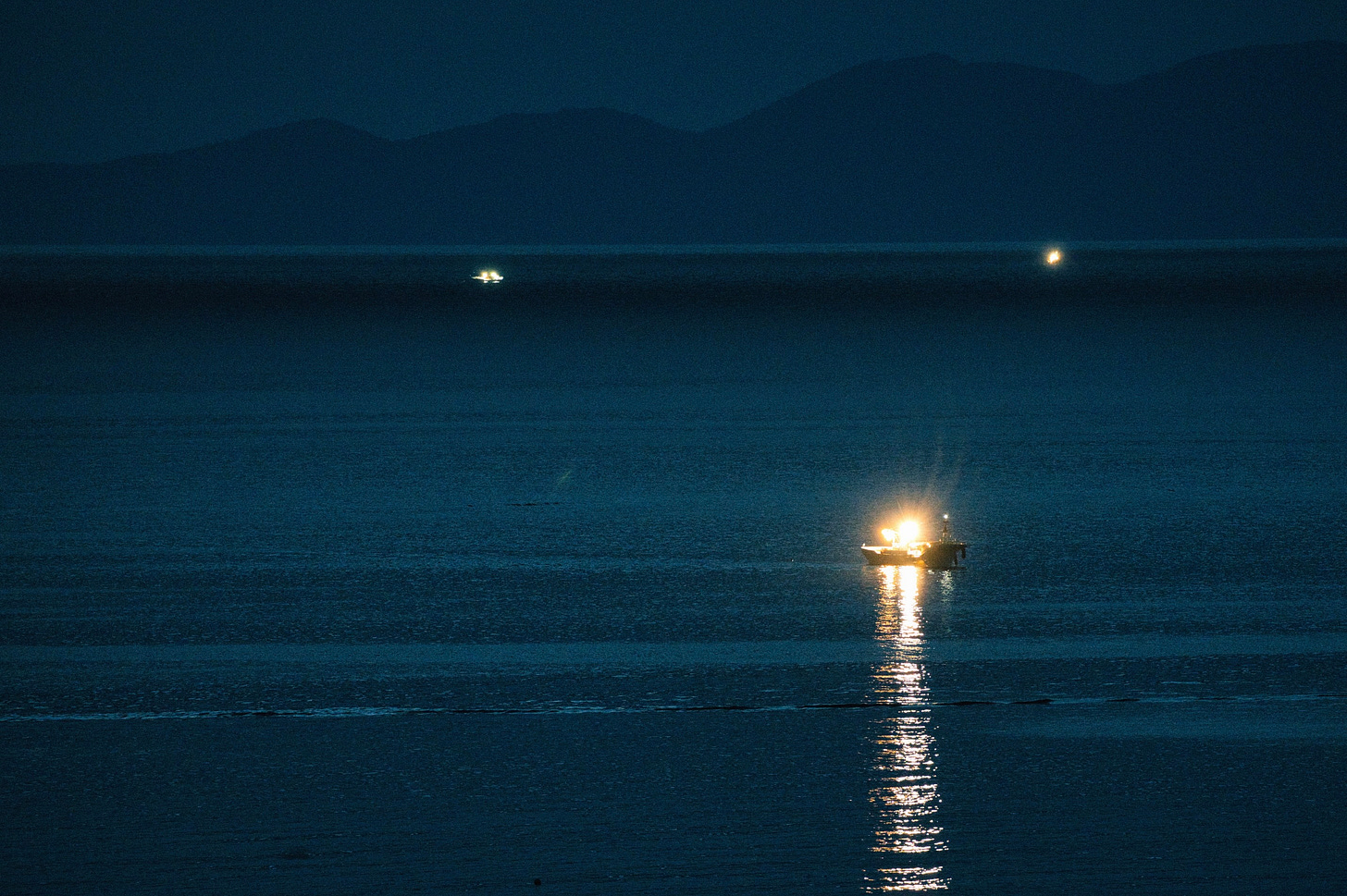The Blues & Billie Armstrong 54
OLD FRIENDS
Previously in The Blues & Billie Armstrong…
For the moment it was forty years ago in my head, but as I reached the north end of the bridge, I checked the reality of the Cadillac’s dashboard clock. Three-thirty, approximately three hours until the sun would set on Molly’s pier. I could still make it… if I still wanted to.
In the passenger seat rode another artifact retrieved from the closet—my mother’s old hatbox, round with silver and gray stripes and faded red roses printed on top.
The hatbox contained important time-travel accessories: a child’s kaleidoscope, a polished abalone shell, the Crow’s Nest motel key, the Kennedy for President button, and the photo of my mother smiling in the blue hat on a windy bluff overlooking the ocean. You know the rest: the pile of letters from Vietnam, some crumpled up newspaper pages, and the pink lipstick envelope, after all these years still unopened. I had the childish notion that Billie and I should open it together.
Somewhere on the back side of the rolling Mayacamas Mountains, just shy of the Lupoyoma County border, the steep road got narrower and windier, the chuckholes bigger and deeper, the asphalt cracked and gouged in spots and warped and bubbled in others, October oak trees shaggy with moss, beer cans and burger wrappers mixed into the rocky slide debris that sometimes extended into the traffic lane. The metal sign marking the county line was freckled with rusty bullet holes.
Lupoyoma County is the only county in the entire state of California without a single mile of railroad track—nobody who’s ever been there was in that big of a hurry to return.
I first got out in 1975, won a fancy scholarship to a private school, but eventually I found college interfered with my wanderlust (and some of my other lusts). In 1980 I ended up back in town when Pop died of the cirrhosis and Molly needed help for a while. I came back to help her, but I was also in sore need of help at the time, broke and road-weary after a couple years rambling up, down and around California and the rest of the West, young, dumb and full of Kerouac.
I came back to Lupoyoma for Molly and myself, and I stayed until breast cancer took her in the summer of 84. Those were some of the darkest years of my life, but I owed her and Pop. They had taken me in when I couldn’t live on Fourth Street anymore. Knowing your father’s secrets is not necessarily the precursor to a healthy adult relationship.
I hit the valley ahead of schedule, pulled in for gas at a new place on the south end of town.
Ran my card and started the pump. There was a rough looking chopped Sportster parked in front of me, primer gas tank, cracked leather seat, balding tires. Out of the mini-mart strolled Timmy Bilderback. Long stringy blonde hair shrouding his face. Gray hoodie zipped up against the autumn air, threadbare jeans, no chaps, dirty Nike knockoffs, not boots.
“Well, what the fuck? Somebody die or something?”
“Didn’t expect to see you either, Tim.”
“Why? Were else would I be?”
“Oh, I don’t know. San Quentin?”
“Funny guy. So, what the hell are you doing around here?”
“Family business,” I said.
He only nodded, like I get it, you ain’t sayin’. He looked at my car. “New Caddy, huh? Must be nice.” It wasn’t exactly a compliment and he didn’t wait for a response, just swung a leg over the duct-taped seat, stomped on the kick starter, revved it up loud and roared off.
I turned north on Main Street and counted the chain stores and fast-food joints that now occupied the fields I once roamed. A few scattered leftover vacant lots with fading for-sale signs. But the center of town much as I’d known it—a patchwork of late 19th century and early 1960s building spurts, every corner filtered through snapshots of old memory, like holograms projected through my eyes. I made the right turn at First Street, toward the shoreline of the big lake. Pulled into the Weeping Willow parking lot heartstruck by that cliché sense of a shrunken world. Even the vast blue-green of Lupoyoma Lake somehow seemed smaller than I remembered.
Back in the late 70s when, for various reasons, tourism started to dry up in Lupoyoma, Molly finagled a liquor license and turned the cafe into more of a bar and grille, heavy on the bar. Sonny the cook became Sonny the bar manager. And when Molly passed, Sonny inherited the whole shebang, the bar and grille and the entire Weeping Willow Resort & Trailer Court—rightfully so, given that I was a strung-out barfly at the time (but that’s another story).
Valentine Jones stood in the parking lot next to a well-worn Toyota pickup raised up over some chunky off-road tires. Not what I expected.
I parked a space away, got out and slowly unfolded out of the Caddy.
“We’re early,” she said, looking at the phone in her hand. “Billie’s not here yet.”
The sun was low in the western sky, veiled by thin clouds but not set.
Her eyes swept the area beyond the parking lot, taking in the scenery of cabins and trailers and trashy cars, and she seemed to be putting something together in her head. “This is where it all happened isn’t it?” she said. “I’ve only seen it in her paintings.”
“Paintings?” I asked. But she ignored me.
“According to my mother, I was conceived in this town. She used to tell me it was a teenage hookup, a one-night stand and then the guy got drafted and died in Vietnam. Said she didn’t even know his last name. No pictures, no letters, no trace. I only learned the truth a couple months ago when she started to feel like the FBI was closing in. That’s when I first heard of Billie Armstrong. And Hank Timmons. And the rest. You know the rest, though, don’t you? At least she thinks you do. And she said if she was right, you would stand up and tell the truth. That’s your brand, right—fearless truth-teller?”
“Well, I’d like to think it’s more than just a brand.”
She gave me a skeptical nod like we’ll see about that, then she took another long look at the setting. “So, where’s this mysterious pier?”
I was relieved at the change of subject, unsure of what Billie thought I knew, or how she thought I knew it, or what she may have told her daughter.
“Pier’s around back,” I said, “Fortunately, we can cut through the bar.”
The glass was all tinted now, you couldn’t see in—or through to the patio like in the old days.
A beer light glowed in one window, but the closed sign hung on the door. Then the door swung open and Sonny stuck his head out. “Well, long time no see, kid.”
“Nice to see you too, old friend.”
We shook hands. His black hair had gone salty, and he’d gained a little beer fat around the middle, but his dark eyes were clear and steady as ever and his handshake just as firm.
“I knew you’d show,” he said.
“Sounds like you know more than I do.”
He gave me a slow mulling-it-over kind of nod and turned to Valentine Jones. “Nice to finally meet you in person.”
They shook hands. “Thank you for agreeing to do this,” she said. “I understand the risk.”
I hadn’t previously thought to wonder how Sonny was involved in all of this. More and more I was starting to feel like I was just a passenger on an unnamed carnival ride.
We went in and the first thing I noticed was that real down-home dive-bar stench, not of poured alcohol ready to be sipped (or tipped or slugged or shot or chugged), but thirty-some years of exhaled alcohol, drunk once and then released into the contained atmosphere as exhaust and trapped there with a permanent tobacco stink in some sad inversion layer, a beer and whiskey smog belched out of fleshy smokestacks with rheumy eyes and mottled teeth. Dank shadows loitered at empty cocktail tables on the edges of the room like ghosts of blackouts past. Buzzy electric light fell across the aged wood and twinkled like Christmas on the hips of liquor bottles. I never felt more at home.
“What’s your drink these days, Archer?”
I hopped up on a stool. “Maker’s, neat.”
Valentine interrupted. “Is the pier through there?” Pointing at a door in the back wall, looking at her phone again. She didn’t wait for an answer, went out the door, but came right back in. “I don’t see her,” she said.
Sonny put the glass of bourbon on the bar in front of me. “Sun’s not down,” he said. “A few more minutes till dark.”
Valentine nodded. “Gin and tonic, then.”
Sonny poured himself a draft and stayed behind the bar. The three of us sipped our drinks and waited. He and I manufactured small talk. How’s business? Seen any of the old gang? What happened to that old Ford? Valentine went to look out the back door every few minutes.
Like a weird echo of the ancient history of this room, the front door swung open and Timmy Bilderback stood in the doorway looking all satisfied with himself.
“Bar’s closed on Mondays, Tim. You know that.” Sonny said.
Timmy glanced at the drinks on the bar. “Don’t look closed to me.”
Sonny didn’t miss a beat. “Private meeting. Invite only. Trying to keep the riffraff out.”
Timmy fake-laughed, looked at me. “Seems like you failed.”
“Alright, what can I do for you, Tim?” Sonny, so calm it sounded like a warning.
Timmy, unruffled, took a stool between me and Valentine’s neglected drink, laid two bucks on the bar. “Cold Bud I guess. Just wondering what’s going on, ya know. I mean, seems like old-home week in here. We all go back aways, we should catch up.” His attempt at a sarcastic smile was undermined by his missing teeth.
Sonny opened a bottle of Budweiser, set it down on the bar and slid it over in front of Timmy.
Valentine, standing by the half-open back door, looked over her shoulder and finally noticed our uninvited guest. “Who’s this?”
I said, “Valentine Jones, meet Timmy Bilderback.”
“Timmy Bilder… uh… where have I heard that name?” Then she made a face like she remembered. “Why is he here?”
“Well, whoever you are,” Timmy said. “I just came in for a beer and a chat with some old friends, that alright with you?”
I said, “We haven’t been friends for a long long time, Tim.”
Outside, the sun dipped behind the mountains and the day began to melt into deep blue. Valentine turned eyes back to the doorway. “There’s a light,” she said. “I see a boat.”
The Blues & Billie Armstrong is a work of fiction. Names, characters, businesses, places, events and incidents in this book are either the product of the author's imagination or used in a fictitious manner. Any resemblance of the fictional characters to actual persons, living or dead, is purely coincidental.
© All Rights Reserved



